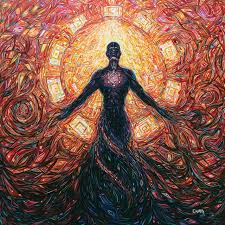What It Means To Be A Spiritual Person Vs. A Religious Person
Knowing the difference will let you discover your truth…
Are you a spiritual person or a religious person? People are inclined to think that these two lifestyles are the same, and on the surface they are.
What they both have in common is connecting to something larger than themselves. And knowing the difference between spirituality and religion will help anyone decide which path they should take to discover their truth.
Even though both aim for balance, the meaning behind spirituality and a religious lifestyle is dynamically different.
Being spiritual doesn’t mean you have the responsibility of worshiping a God. Instead, spirituality helps others focus not just on their own well-being, but for others, nature, or any sacred being. It focuses on the art of understanding the way of life, change, and living in a sacred manner.
Being religious is a personal system in which one follows spiritual guidelines, beliefs, practices, and worship of God or Gods.
Both of these are routes to discovering the divine truth. While religion looks to God for purpose, spirituality looks within life’s foundation.
Whether religious or spiritual, it’s vital that both are used for balance and not for selfish desires. Even though the connection shares a major common ground, spirituality and religion differ in more ways than one.
Here are some examples of the differences between the two.
1. Religion focuses on groups, spirituality focuses on individuality.
Religious people lean on gathering with others, to reach a unison connection with God, but spirituality develops their own belief system. Spiritual people tend to be more individual and less dependent on others to seek a stronger connection.
Sunday services and disciple groups help religious people study the Bible together to understand scripture. Religion is the belief of another man’s experience written down in sacred scripture, but spirituality is the belief of one’s own experience.
2. Religion has rules, spirituality has privacy.
Religion has a set of rules that followers must obey in order to stay “pure” and “holy.” Those rules encourage them to develop discipline to grow closer to God. These rules are public so others draw near, all in order for a church to increase their congregation.
Spirituality is more personal. While religion has various rules that others may or may not agree with, spirituality focuses on an individual’s aspect of a belief.
Spirituality offers an endless amount of potential benefits, while with religion it offers punishments or rewards. Spiritual people listen to their hearts and their own conscious mind in order to do what is right for their unique self.
3. Religion is tradition, spirituality tends to change as we grow.
As a spiritual person grows in life, so will their perception and beliefs. Through experience and self-reflection, a spiritual person will express a different aspect to reveal their version of the truth.
Religion is an ideology that holds ancient traditions that have kept communities together. If a change was to occur in religion, it would be a slow process. For example, churches are slowly accepting LGBTQ acceptance into their congregation, which before was unheard of.
If you notice, others abuse religion to inflict fear into another’s mind. It has caused wars and major conflict between ecocentric groups and countries.
Spirituality focuses on spreading love and selfless acts. It focuses only on good energy to allow people to be the best version of themselves.
4. Religion defines the truth, spiritual people decide their own truth.
Religion includes a preacher or religious leader who defines what the truth is to their congregation. They believe in sacred scriptures and expressing their own translation.
Spirituality seeks its own truth and translates it based on one’s experience. While one truth is being defined, the other is being discovered.
5. Religion intends to please a God or Gods, spirituality focuses on relationships.
Spirituality is a part of humanity that’s seeking a purpose in life. Being religious has a more connotative reaction from others.
It’s common to abuse religious power to degrade others for their lack of “purity.” But spirituality doesn’t aim to please a specific God; rather, it focuses on interpersonal and intrapersonal relationships.
6. Religion can be exclusive, spirituality is inclusive.
Religion is based upon traditional beliefs and teachings that may impose very strict interpretations and limitations, often excluding people of certain communities. Their worldview can isolate people who don’t see it that way.
Spirituality doesn’t make distinctions of that sort. The foundation of spirituality is a pure spirit of unifying force. That is, nobody is left out, behind, or forgotten.
7. Religion leans on faith, spirituality leans on experience.
Religion is faith. There’s no scientific evidence to corroborate its existence.
It’s a blind belief in something with unconditional acceptance of its teachings. There’s no questioning it. It’s believing without having it proven to you.
Spirituality leans heavily on the personal experience of one’s soul. The practices of spirituality, like meditation and yoga, gives people the chance to make “conscious contact” with expanded states of consciousness. This allows those who practice the teachings to experientially validate them.
8. Religion focuses on the future, spirituality deals with the present.
Spirituality focuses heavily on the now. It deals with being fully present and living as it happens. Spirituality embraces everything good, bad, and neutral as it happens without worrying about a future reward.
Religion requires one to worship so they will be rewarded later on. Some religions have a reward that comes after death, like getting into heaven.
Can you be both religious and spiritual?
Yes, someone can be both spiritual and religious.
Spiritual people can feel a stronger connection when their beliefs are intertwined with religion. For example, they may believe in God while asking for positive energy through their journey of self-discovering.
A way to practice both in a healthy manner will take some adjustment. A person will tend to lean on one side instead of balancing both. For example, if a person is more religious, they run the risk of becoming socially dependent on their church peers.
Being too spiritual may also cause long-term separation from loved ones or more concern for their own issues, instead of trusting a higher being for tomorrow’s worry.
Make sure that whatever path you choose to follow you bring a healthy balance to your lifestyle




